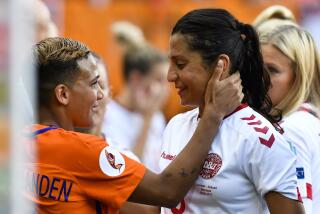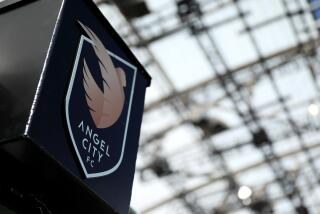Glazer’s Foes United
Malcolm Glazer gained full control of Manchester United on Monday, a controversial $1.47-billion acquisition that brought some supporters of the world’s most famous soccer club to the boiling point.
The 76-year-old billionaire is best known as the owner of the NFL’s Tampa Bay Buccaneers and he has limited known soccer knowledge or background. But the concerns of United’s fans go deeper than the fact he is an American outsider.
UEFA, European soccer’s governing body, has suggested that the hundreds of millions of debt Glazer’s purchase is imposing on the previously debt-free Manchester team could cause the Red Devils to be banned from European competition.
The chance of that is slight, but the fans are worried that Glazer will raise prices for tickets and merchandise and might pinch pennies when it comes to investing in top-level players.
As Glazer last week crept closer to achieving the 75% interest that would give him complete control of the team there was a noisy but peaceful sit-down protest outside the club’s 68,000-seat Old Trafford stadium in Manchester. But later, more militant fans turned violent, storming into the Manchester Art Gallery and tossing wine over the guests at a dinner staged by the investment bank JP Morgan, one of Glazer’s chief lenders.
That mirrored earlier attacks on the cars of club directors who had sold their shares to Glazer. More protests are planned Saturday when United plays rival Arsenal in the Football Assn. Cup Finals in Wales.
“We are calling on all supporters to wear black in Cardiff on Saturday,” Mark Longden of the Independent Manchester United Supporters Assn. said Monday. “If they can get hold of black flags, they should wave them -- because it represents what is happening to the club.
“In addition, people should decline to renew their season tickets and memberships and cancel subscriptions to MUTV. We would also urge them to boycott the products of sponsors such as Vodafone, Nike, Budweiser and Audi, and explain to those companies why.”
Seldom in the history of the English league has one man percolated the waters as much as Glazer has with his takeover of the 127-year-old club.
Glazer’s previous attempted purchases -- first of Hollywood Park and then of the Dodgers -- aroused nowhere near as much clamor.
Manchester United is an institution in English sports and the club has a worldwide following that Glazer, from West Palm Beach, hopes will eventually allow his huge investment to turn a profit.
First, however, he has to win over the skeptics who point out that Glazer raised prices after buying the NFL’s Buccaneers in 1995, ignoring that he also put many millions into the once-hapless club and helped it win the Super Bowl in 2003.
Glazer’s first big test as owner of United will be to win over Sir Alex Ferguson, the short-tempered, no-nonsense Scot who is the most successful coach in British soccer history. Ferguson has asked to meet Glazer in person before making any decisions about his own future.
Since taking charge in 1986, Ferguson, 63, has led Manchester United to eight Premier League titles, five F.A. Cups and one European Champions League title.
But Glazer’s coup could end Ferguson’s reign if the two do not see eye to eye.
Concern for the moment, however, surrounds Saturday’s Cup Final, when Manchester United plays Arsenal at the Millennium Stadium in Cardiff in the 124th edition of soccer’s oldest knockout competition.
There is bad blood between the teams, dating back for decades but exacerbated in October when Manchester United’s 2-0 victory at Old Trafford ended Arsenal’s record 49-match unbeaten streak and sparked a player brawl in the tunnel in which Ferguson was spattered by a cup of soup thrown by an Arsenal player.
The season, which ended Sunday, subsequently went awry for both, as Chelsea won the league championship and Liverpool reached the May 25 European Champions League final in Istanbul, Turkey.
Arsenal finished second and Manchester United third, and Saturday’s Cup Final is their last chance to salvage something. The atmosphere is certain to be volatile.
“We won’t do anything that endangers safety, but they may have to draft in the army to police the match,” said Oliver Houston, of the Manchester fan group Shareholders United.
United fans are threatening protests against Glazer, while Arsenal fans are almost certain to taunt them about the “loss” of their club.
The sale became a fait accompli when Glazer’s company, Red Football, which had been buying Manchester United shares since 2003, had, by the close of trading on the London Stock Exchange, increased its share to 75.7% of Manchester United stock.
Having surpassed that threshold, Glazer can take private ownership of the club and has said he will do so within a month. Manchester United, founded in 1878, has been a publicly traded company since 1991.
If Glazer’s stake reaches 90% the remaining investors are, by London Stock Exchange rules, obliged to part with their stock.
Glazer, one or more of whose sons, Bryan, Joel and Ed, will be involved in running United, put $503 million of his own money into buying the team, and will borrow another $490 million to help fund the takeover.
The borrowed figure concerns not only soccer league officials, but also the NFL. League spokesman Greg Aiello said last week that the NFL’s finance committee would “look for issues of concern” when it meets in Washington next week, especially if Glazer intends to use the Buccaneers as collateral for a loan.
Glazer, an intensely private figure who has seen Tampa Bay’s value more than triple since his purchase, has pledged not to sell the Buccaneers.
The NFL has cross-ownership policies that, in theory, do not allow its owners to compete against one another in the same market.
The league has ignored that in the case of Major League Soccer, however, with Kansas City Chief owner Lamar Hunt owning FC Dallas in the Cowboys’ backyard. Similarly, New England Patriot owner Robert Kraft for a while operated the San Jose Earthquakes in San Francisco 49er territory.
Meanwhile, UEFA is busy toughening its own rules on club indebtedness and solvency.
Currently, clubs can compete in continent-wide competition such as the hugely lucrative Champions League only under a license from their own national soccer federations.
Keeping such a license is usually automatic, unless a club gets into serious problems and cannot pay its staff or debts to other clubs for player transfers and such.
But UEFA now wants to extend that to cover debts to banks as well, which could put Manchester United at risk under Glazer’s financing plan.
“If one club was permanently in debt to banks, and that debt showed no sign of clearing or, in fact, got bigger year by year, then we would look very closely at that situation and then the license of that club would have to be reviewed,” a UEFA spokesman said last week.
Such a development, unlikely but not impossible, would be a body blow to Manchester United and would infuriate fans accustomed to seeing their club compete against the very best in Europe.
For them, it is not Glazer’s nationality or personality that is at issue. Foreign owners are not uncommon in the Premier League. Chelsea is owned by Russian billionaire Roman Abramovich. Fulham is owned by Egyptian billionaire and Harrods owner Mohammed Fayed. Portsmouth is owned by Serbia-born American businessman Milan Mandaric of San Jose.
The fans fear that big money is robbing them of the one thing they have: their team.
“It all has the look of a desperately listing ship,” columnist Kevin Mitchell wrote in Sunday’s Observer newspaper in England. “There could be worse to come.
“If Glazer is as ruthless as his critics say ... he will provide United supporters with the most terrible dilemma: To stay and fight, or walk away, disillusioned by the virus that has taken such a grip on all of football: Greed.”
*
(BEGIN TEXT OF INFOBOX)
chester divided
Malcolm Glazer has gained control of a Manchester United team that grossed about $313 million last year, down more than $7 million from a year earlier.
Gross income, 2003-04: $313 million
Television and other media: $116 million
Ticket-related sales: $113 million
Commercial sponsorships: $84 million
*
Source: The Guardian. Graphics reporting by Grahame L. Jones
*
Times staff writer Sam Farmer and Associated Press contributed to this report.






